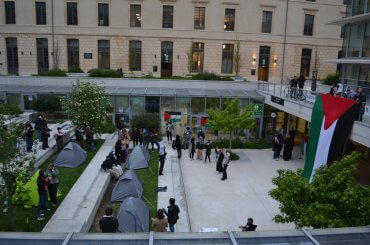I’m still mulling Marty Peretz’s longish phone conversation with Obama about Israel, also Jeffrey Goldberg’s longish interview with the candidate. One of the weird things about both conversations is the sense that Goldberg and Peretz are extracting a promise from Obama to the Jewish community. Indeed, Goldberg establishes himself as a Jew who is a guardian of Jewish "worry". In a sense, neither is that interested in what Obama really thinks–both men behave less like journalists than petitioners, trying to get Obama on the record expressing his support of the Jewish state as an answer to the Jewish problem. "I’m curious to hear you talk about the Zionist idea. Do you believe that it has justice on its side?" Goldberg asks. Then: "Do you think that justice is still on Israel’s side?"
The whole thing feels like a reprisal of the Balfour Declaration, 91 years on, with Peretz and Goldberg reenacting the roles of Chaim Weizmann and Lord Rothschild, and Obama playing the role of the British ruler. Here’s why the analogy fits, and why it is actually helpful in understanding Israel/Palestine:
The Balfour Declaration was the short note signed by British foreign
secretary Arthur Balfour in 1917 promising a homeland in Palestine to
the "Jewish people." At that time, the British were the lords of the
liberal west, as we are today. They were about to take over the Middle
East–that is if we won the world war–and there is considerable
evidence that the English saw Jews as crucial to doing so. The
Royal Institute of Chatham House–England’s Council on Foreign
Relations–was to say after the war, in Tom Segev’s retelling,
"London had been inundated with reports from all over the world,
asserting that the sympathy of the Jews was vital to winning the war.
The Balfour Declaration, the institute resolved, had indeed been a
means to victory. The fact was that other countries had also competed
for Jewish support, the report noted." As I recall from my reading,
England feared that if he didn’t get what he wanted in London, Weizmann
would go to Germany. And don’t forget, Weizmann
was a chemist, whose invention of acetone was essential to the
development of modern munitions. The British were keenly grateful to the
Jews for their learning, as American society is today.
I am trying to convey the fact that Jewish support was extremely
meaningful to leaders then– as it is in Obama’s mind today, in his
war. Jewish finance was essential to the workings
of the modern state (here I always point to Benjamin Ginsberg’s book,
The Fatal Embrace), and western powers had no illusions on this score. Because of Jewish rage over the pogroms, Jewish bankers in the U.S. had
starved Russia of funding during the Japanese-Russian war of ’03,
helping to defeat Russia–truly a great moment in my people’s history
and a legitimate flexing of Jewish lobby muscle in the name of human
rights. Many big Jews lobbied for the Balfour Declaration. In this country, Supreme Court
Justice Louis Brandeis, who had turned Zionist a few years before, worked on Woodrow Wilson to echo the Balfour Declaration in 1918.
In
my analogy, Peretz is Lord Rothschild, the money guy, and Goldberg is
Weizmann, the intellectual. The statements by Obama seem as forcible to
me as Balfour’s elliptical note of 1917. And clearly, to judge from
Goldberg’s comments, the sense of Jews as being imperilled is just as
strong in his mind as it was for Weizmann–and therefore, the necessity
of a Jewish state to afford Jews protection.
That is where the analogy falls down, and indeed why Peretz and
Goldberg’s actions seem to me anachronistic, backward. It is more than
60 years since the Holocaust; there are no pogroms. The U.S. has proved
itself time and again to be a safe place for Jews, more than safe, notwithstanding the
Jewish "worry" that Goldberg invokes. In the early 20th century,
Rothschild and Brandeis felt answerable to the dispossessed Eastern
European Jews. But who are Peretz and Goldberg worried about? The
Israelis. And in Israel we can see the
110-year-long unfolding of Herzl’s vision of political Zionism; and how have things
worked out? The Palestinians are dispossessed and stateless, in
violation of the Balfour Declaration’s guarantee that their political
rights would not be prejudiced–for as any Israel lobbyist can tell
you, the Palestinians have again and again, for more than 60 years, shown
themselves unworthy of the right of self-determination that we see as
legitimate when it is Kosovars or Irish or Pakistanis or South
Africans, violent as those people’s national struggles have been.
And still the Palestinian grievance has grown in the mind of the world to
the point that the U.N. is now using the word "Nakba," to recognize the
Palestinian dispossession, and to the point that Zionism’s legitimacy
is being openly questioned– in Europe, at the U.N., throughout the
Arab world, and even in some editorial pages here.
So the Balfour Declaration must be renewed, inked again by the leader
of the latest imperial power.
Unless Israel reforms and until the U.S.
stops enabling it, powerful Jews will have to keep on extracting
Balfour Declarations for a long time.

